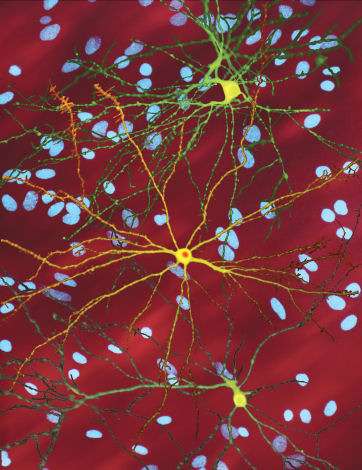Huntington drug successfully lowers levels of disease-causing protein

An international clinical trial has found that a new drug for Huntington disease is safe, and that treatment with the drug successfully lowers levels of the abnormal protein that causes the debilitating disease in patients.
In a study published today in the New England Journal of Medicine, researchers from UBC and their colleagues have demonstrated for the first time that the drug, IONIS-HTTRX (now known as RO7234292) successfully lowered levels of the mutant huntingtin protein—the toxic protein that causes Huntington disease—in the central nervous system of patients.
"This is a tremendously exciting and promising result for patients and families affected by this devastating genetic brain disorder," said Dr. Blair Leavitt, neurologist and director of research at the Centre for Huntington Disease at UBC. "For the first time, we have evidence that a treatment can not only decrease levels of the toxic disease-causing protein in patients, but that it is also safe and very well tolerated."
Leavitt, who is also a senior scientist at the Centre for Molecular Medicine and Therapeutics in the UBC faculty of medicine, treated all the Canadian participants in this study, including the first patient enrolled in the study in September 2015.
Huntington disease (HD) is a fatal genetic neurological disease. It usually develops in adulthood and causes abnormal involuntary movements, psychiatric symptoms and dementia. About one in 10,000 people in Canada have HD. To date, no effective treatments have been proven to slow down progression of this disorder. HD is caused by a single known genetic mutation, and each child of a carrier of the mutation has a 50 per cent chance of inheriting the disease.
The trial enrolled 46 patients with early HD at nine study centres in Canada, the United Kingdom, and Germany. Of the 46 patients, 34 were randomized to receive the drug and 12 were randomized to receive placebo. Each participant received four doses of the drug and all study participants completed the study and have continued to receive the active drug in an on-going open-label study. The drug was administered monthly to patients via an injection directly into the cerebrospinal fluid.
The researchers, led by Dr. Sarah Tabrizi, director of the Huntington Disease Centre at University College London and global chief investigator of the IONIS-HTTRX clinical trial, found that the drug produced significant decreases in the levels of mutant huntingtin protein in the patients' cerebrospinal fluid. None of the patients experienced any serious adverse reactions, suggesting that the treatment is safe and well tolerated by patients.
The drug is currently being evaluated in a large phase three multi-center clinical trial being performed at the Centre for Huntington Disease at UBC and other HD centres around the world. This study is designed to determine whether the treatment slows or halts the progression of disease symptoms.
More information: New England Journal of Medicine (2019). www.nejm.org/doi/full/10.1056/NEJMoa1900907
















